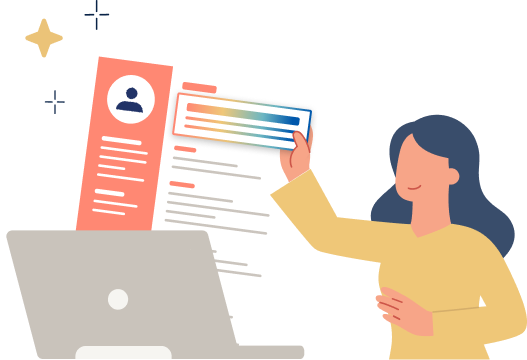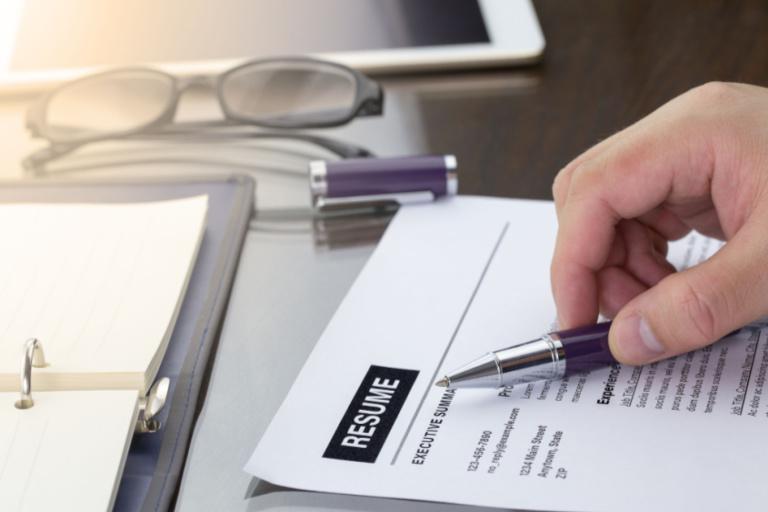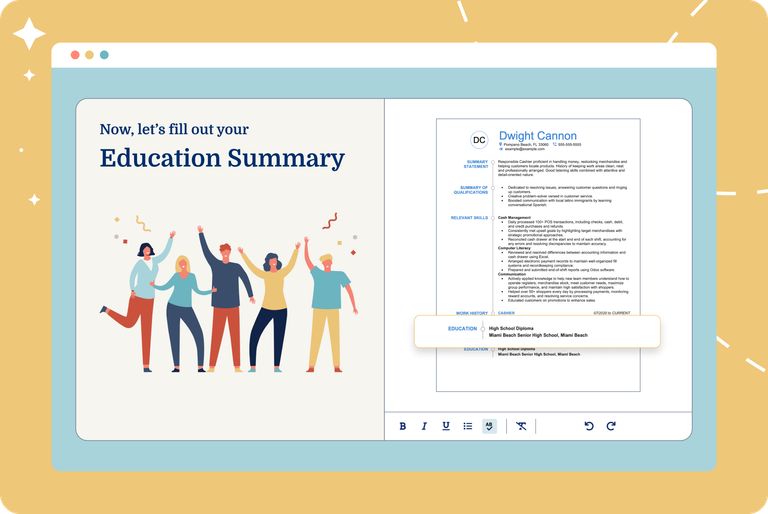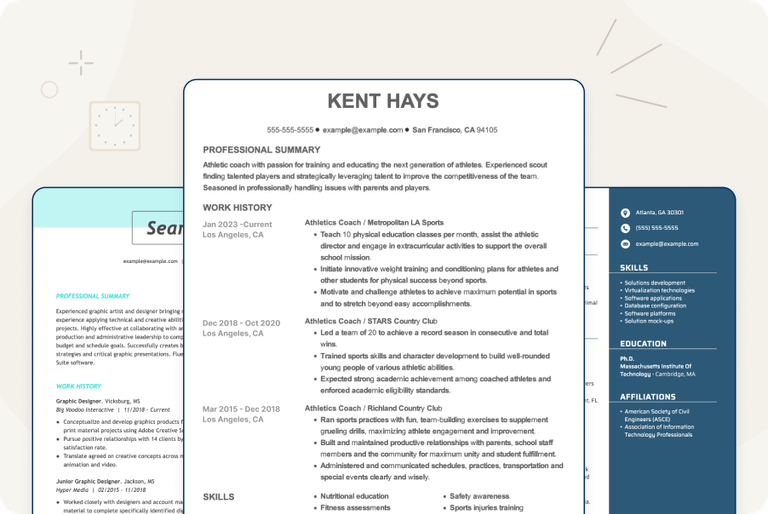Event Planning Skills for a Resume (Examples & Tips)

Our customers have been hired at: *Foot Note
AI Resume Skills Generator

Event planners combine creativity, organization and attention to detail to transform ideas into plans, weaving together the threads of logistics and aesthetics to create unforgettable client experiences.
The US Bureau of Labor Statistics projects that jobs in the meetings and events industry will grow 8% through 2032. Employment planning services will be in demand over the next decade, with more than 15,000 job openings expected yearly. Those are great numbers, but you need the right event planning skills to get ahead of the competition.
Make a resume with MyPerfectResume
Our Resume builder can help you write the perfect resume. Start Now!
What are event planning skills?
Event planning skills are the knowledge and abilities event planners use to perform the essential functions of their jobs. To excel at their jobs, event planners must have diverse skills, including strong organizational abilities, effective communication and creativity. They also need industry-specific knowledge and technical skills to perform their best work.
Examples of event planning skills
Hard skills
Hard skills are concrete abilities and knowledge gained through education and experience.
Event planners use an array of hard skills to excel at their jobs, including:
- Budget management
- Vendor management
- Logistics planning
- Contracts
- Strategic planning
- Knowledge of regulations
- Data analysis
- Risk management
- Digital marketing
- Advertising
Soft skills
Soft skills are crucial in the event planning industry since event planners must work closely with people and manage several tasks simultaneously.
Here are ten soft skills for event planners:
- Time management
- Organizational skills
- Patience
- Problem-solving
- Negotiation
- Creativity
- Verbal and written communication
- Active listening
- Attention to detail
- Customer service
Technical skills
Technical skills are important for event planners since they rely on technology to streamline processes, enhance efficiency and streamline workflows.
The following technical event planning skills will put you ahead of the curve:
- Project management software
- Audiovisual technology
- Virtual event platforms
- Email marketing tools
- Venue booking platforms
- Financial management software
- Customer relationship management (CRM) systems
- Mobile applications
- Survey and feedback tools
- Event marketing and promotion tools
Interpersonal skills
Interpersonal skills are integral to every aspect of event planning, from client consultations to building vendor relationships. Here are ten interpersonal skills every event planner needs:
- Cultural sensitivity
- Relationship-building
- Conflict resolution
- Consensus-building
- Influence
- Persuasion
- Leadership
- Networking
- Collaboration
- Emotional intelligence
Transferable skills
Transferable skills are hard and soft skills that event planners can leverage for multiple job functions throughout their careers.
Here are 10 valuable transferable skills for the event planning industry:
- Perseverance
- Adaptability
- Resourcefulness
- Flexibility
- Research
- Coordination
- Public speaking
- Decision making
- Tenacity
- Ability to stay calm under pressure
How to improve your event planning skills
Improving your event planning skills is important to stay relevant and competitive in the event planning industry. Here are some effective ways to enhance your skills:
- Gain practical experience: Some great ways to get practical experience when you are new to event planning include volunteering to organize events in your community, interning with event planning companies, or seeking out experienced event planners as mentors.
- Look for professional development opportunities: Attend event planning workshops, seminars, conferences and webinars to expand your event planning skills and knowledge.
- Obtain certifications: Event planning certifications will expand your skill set while demonstrating your expertise and credibility to potential clients and employers.
- Learn the tools of the trade: To stay competitive, familiarize yourself with the latest event management platforms, project management tools, marketing automation software, and virtual event platforms.
- Start networking: Networking is essential for career growth in event planning. Attend industry events, join professional associations such as the International Live Events Association (ILEA) or Meeting Professionals International (MPI), and connect with peers, mentors and industry professionals.
- Solicit feedback: Ask for feedback from clients, vendors, and colleagues to identify areas for improvement in your event planning skills. Then, analyze your accomplishments and identify areas for improvement.
How to highlight event planning on your resume
When adding event planning skills to your resume, you must be strategic about how and where to display them. You should have a dedicated skills section to display your job-relevant skills, but consider highlighting them throughout your resume for a bigger impact.
Here’s how to display your event planning skills in your resume in seven steps:
- First, consider your resume format. There are three common formats, and each one will display your skills differently.
- Next, choose a professional resume template to showcase your event planning skills and ensure you are formatting your resume correctly.
- Prepare to write your resume by reviewing the job description and matching your event planning skills and accomplishments to the job requirements.
- Add two or three job-relevant skills to your resume summary or objective to immediately grab potential employers' attention.
- Use your work history section to show what you’ve accomplished with your event planning skills. For example, “Orchestrated a corporate conference that surpassed expectations, drawing in 500 attendees, a 30% increase from the previous year.”
- Create a skills section to highlight your event planning skills. To make each one stand out, you might create categories to showcase specific types of skills, like “Interpersonal Skills” and “Technical Skills.”
Pro-tip: Use action words when showcasing your achievements for maximum impact!
Common tools and technologies used in event planning
Event planners need various tools and technologies to streamline workflow, enhance productivity, and deliver successful events. Here are some common tools to be familiar with as an event planner:
- Event management software: Popular platforms like Cvent, Eventbrite, or Bizzabo offer comprehensive event management solutions for registration, ticketing, attendee management and communication.
- Project management tools: Asana, Trello, or Monday.com help organize tasks, set deadlines, assign responsibilities, and track progress throughout the event planning process.
- Venue sourcing platforms: Websites like VenueScanner or Peerspace assist event planners in finding suitable venues by providing search filters, venue details, pricing information and reviews.
- Event planning apps: Mobile apps such as Evernote, Google Keep, or Microsoft OneNote are crucial for event planners to capture ideas, create to-do lists, and access important information on the go.
- Social media management tools: Hootsuite, Buffer and Sprout Social make it easier to schedule posts, monitor social engagement, and analyze social media metrics to promote events effectively.
- Graphic design software: Tools like Canva, Adobe Spark, or Piktochart empower event planners to create visually appealing event materials such as invitations, banners, signage, and graphics necessary to promote events.
- Event website builders: Platforms like WordPress, Squarespace and Wix enable event planners to design and customize event websites.
- Budgeting and financial management software: Software such as QuickBooks, FreshBooks and Expensify help event planners track expenses, manage budgets, generate financial reports, and streamline reimbursement processes for their events.
- Communication platforms: Slack, Microsoft Teams and Zoom facilitate real-time communication and collaboration among event planning teams, vendors, clients and stakeholders.
- Event analytics and reporting tools: Platforms like Google Analytics, Eventbrite Analytics and HubSpot provide insights into attendee demographics, registration trends, ticket sales, marketing performance, and other key metrics crucial to evaluating event success and informing future planning efforts.
Best event planning certifications
Certifications are essential for professional development. Many clients and potential employers look for certifications on event planning resumes because they demonstrate tangible proof of event planning skills, knowledge and expertise.
Here are some widely recognized certifications in the event planning industry:
- Certified Meeting Professional (CMP)
- Certified Special Events Professional (CSEP)
- Certified Wedding Planner (CWP)
- Digital Event Strategist (DES)
- Certified Event Planner (CEP)
Key takeaways
If you take nothing else with you from this guide to event planning skills, remember these key points:
- To succeed as an event planner, you must keep your event planning skills sharp and continuously learn new tools and technologies.
- Show the impact you have made with your event planning skills by highlighting your measurable achievements on your resume.
- Add three to five event planning job-relevant skills in your resume summary or objective so potential employers can see what you offer immediately.
- Effective ways to enhance your event planning skills include networking, attending event planning seminars and conferences and obtaining certifications.
- Event planners rely on technology to enhance workflows, collaborate with vendors and clients and promote their events, so it's important for them to stay current on the latest trends in event planning technology.
FAQ
How do I create an event planning resume that stands out?
Here are three ways to create a standout event planning:
- Highlight your job-relevant skills, experience, certifications, and achievements in every section of your resume.
- Showcase examples of projects you’ve worked on, as well as your role, responsibilities, and accomplishments for each job.
- Tailor your resume to each job application using keywords from the job description.
What are some essential soft skills for event planning?
Essential soft skills for event planning include communication, organization, problem-solving, time management, adaptability, attention to detail, creativity, negotiation and teamwork.
How can I improve my event planning skills?
You can improve your event planning skills through practical experience, seeking professional development opportunities, obtaining certifications, developing technical skills, building a strong network, soliciting feedback, and reflecting on past achievements can all help to improve your event planning skills.
What is involved in event planning?
Event planning involves coordinating all aspects of an event, including venue selection, budgeting, logistics, vendor management, marketing and promotion, attendee registration, program development, on-site management, and post-event evaluation
What should I include in an event planning resume?
In an event planning resume, you should include your contact information, a professional summary or objective statement, relevant work experience, event planning skills, education and certifications, and relevant accomplishments and achievements.
How do I showcase my event planning skills on my resume?
To showcase your event planning skills on your resume, highlight relevant measurable accomplishments, such as successful events you have planned and executed, job-relevant skills like budget management and vendor coordination in your summary or objective, work history and skills section. If you have job-related training or certifications that have helped you enhance your skills, create separate sections to showcase them.
What are some common mistakes to avoid on an event planning resume?
Common mistakes to avoid on an event planning resume include including irrelevant information like your age or gender, not formatting your resume correctly, using generic or vague language, filling your resume with industry jargon, neglecting to quantify your achievements, and not tailoring your resume to the specific job or employer.
How can I stand out as an event planner in a competitive job market?
To stand out as an event planner in a competitive job market, focus on showcasing your unique event planner skills, experiences, and accomplishments. Add volunteer experience or community service, get certified in a specific area of event planning or an event planning technology, keep abreast of changes in your industry and tailor your resume and cover letter to each job application.
What are some important considerations for planning virtual events?
Important considerations for planning virtual events include selecting the right virtual event platform, designing engaging and interactive content, promoting the event effectively to attract attendees, testing technology and equipment in advance, and ensuring you have technical support during the event.
How can I keep my event planning skills current in a rapidly evolving industry?
To keep your event planning skills current, stay updated on industry trends and best practices, attend workshops, seminars, and conferences, participate in online courses and webinars, join professional associations, and seek opportunities for continuous learning and professional development.
How we reviewed this article
Since 2012, we have helped more than 11 million job seekers. We want to make your career journey accessible and manageable through our services and Career Center’s how-to guides and tips. In our commitment to bring you a transparent process, we present our Editorial Process.
Sources
- Chron. Article. Dowd, Mary. Where Do I Start if I want to Become an Event Planner?
- Cvent. Article. Guest Author. 12 Event Planning Skills you Need for Success
- DeVry University. Article. No Author. How to Become an Event Planner
- Hubilo. Article. No Author. Top 15 Event Planning & Management Skills for Event Planners
- United States Bureau of Labor Statistics. No Author. Occupational Outlook Handbook. Meeting, Convention, and Event Planners
Our customers have been hired at:*Foot Note











